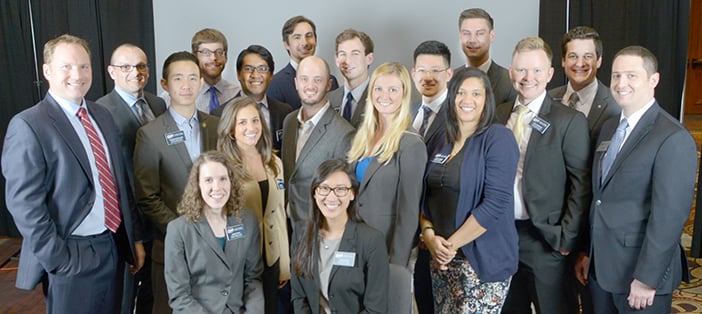Answering Common EM Interview Questions as Your Most Authentic Self
Shelby Wood, MD, MPH - St. George’s University School of Medicine
EMRA MSC International Representative 2020-2021
Twitter
Calling all #EMbound soon-to-be MS4s! With the 2021 Match cycle in the books, your time to shine is rapidly approaching. Before you know it, you will be opening up ERAS for the first time, applying to the emergency medicine residency programs of your dreams, and racking up interview invites. One of the most intimidating parts of this process for many applicants is the interview itself, especially the uncertainty of wondering what questions you’re going to be asked and what the interviewer really wants to know about you. One piece of advice that I received consistently on the virtual interview trail was this: “be yourself.” Now that I’m on the other side of the interview process (and a matched soon-to-be intern by the time this is published!), I’d like to share my approach to answering these commonly-asked residency interview questions as your most authentic self!
- Tell me about yourself. The classic interview opening line, and despite its deceptive simplicity, often the most difficult question to answer. This is your chance to give your “elevator pitch,” a 30-60 second summary of everything in your life that has led you here to this very moment. No pressure, right? Think of this as your (super-condensed) superhero origin story - your interviewer generally wants to know where you came from, a brief explanation of your journey to medicine (and more specifically, emergency medicine), and something unique about yourself that you would bring to the table as an intern in their program. What they are NOT looking for is a laundry list of your accomplishments or a retelling of your CV from beginning to end. Chances are, they have done as much homework on you as you have done on them, and they may even have your CV/application in front of them to glance at throughout the interview. The interviewer generally wants to hear about what makes you special in your own words, so use this to your advantage. Now is certainly not the time to be humble! If you were invited to interview, this program already sees you as one of their potential interns, so this is your moment to stand out and make sure that they remember your name long after your interview day.
- Tell me something about you that’s NOT on your application. This is a variation on the theme described above. Since it’s a fairly open-ended question, it may cause a few interviewees to stumble - after spending hours upon hours transcribing your entire life into ERAS, what else could you possibly have to add? Well, maybe you grew up with a single parent and this helped you develop your fierce work ethic. Maybe you rowed crew in college and this taught you about discipline and teamwork. Whichever personal factoid you choose to offer, try to relate it back to EM as much as possible. This is one that you might want to have an impactful answer prepared for ahead of time instead of coming up with it on the fly.
- What are your strengths and weaknesses? While it is infinitely easier to talk about your strengths than disclose your weaknesses, there is still a way to use this question to your advantage. The common theme in your interviews is that everything should relate back to emergency medicine and why you would be a great addition to this program. When describing your strengths, think about some qualities that you would look for in an emergency physician - hard-working, inquisitive, confident, dedicated, collaborative, respectful, adventurous, cool under pressure - and try to see some of those traits within yourself. When it comes to weaknesses (or as I like to say, “areas for improvement”), nothing you say should be considered a “red flag” if you immediately follow up with how you are currently working to improve upon it. If you tend to be shy around new people, let your interviewer know that you are making an effort to open up in social situations and that you are looking forward to becoming friends with your new coworkers during orientation month. If your take-charge attitude tends to come across as pushy, bossy or disrespectful, reflect on what you have learned from a past negative encounter and describe how you plan to be mindful of your communication style with support staff as a resident. Your interviewer will appreciate this level of maturity and introspection, and respect that you are willing to admit your faults and do the work to better yourself.
- What is your favorite (or least favorite) thing about emergency medicine? This is your chance to rave about what you love about the best specialty in the world. And honestly, what’s not to love? EM is fast-paced and exciting with an ever-changing work environment, the occasional adrenaline rush, and the chance to care for all patients anytime and anywhere, regardless of age, race, ethnicity, gender, sexual orientation, disability, spirituality, or socioeconomic status. But there are some tough parts of the job that interviewers want to make sure that you’ve thought long and hard about before signing on to do this work for the rest of your life. Some patients will be difficult, maybe even violent or abusive (another common question: What is your least favorite type of patient?). You will have to work nights, weekends and holidays for the foreseeable future, which will inevitably result in missing important life events with your family and friends. The healthcare system can be frustrating, especially when dealing with under/uninsured populations in poorly-resourced environments or rural areas. But if you still love EM despite its not-so-loveable parts, your interviewer will know that you are equipped with realistic expectations that you will need for intern year.
- What qualities do you value in a coworker? This question is code for “Do you know what it takes to be a good EM resident?”. Your interviewer is asking this to assess your values about the workplace, which are a strong indicator of what kind of resident you will be. If you believe that a good coworker/co-resident is honest, hardworking, selfless, dedicated, a team player, etc. you have not only described the typical Emergency Department staff member but also informed your interviewer that these are likely qualities that you will strive to embody as an intern in their program. On the flip side, your interviewer could also ask something like, “What is your least favorite quality in a coworker?”, and you will inevitably describe someone who is lazy, disrespectful, bossy, or untrustworthy. No matter how you choose to answer the latter question, it is important to follow this up with ways that you would maintain a healthy working relationship with this type of person in a professional setting, using personal examples if possible. It takes all kinds of personalities to make an ED function, and while you might not love everyone you work with, it’s important that you are able to work with them effectively when patient safety hangs in the balance.
- Tell me about a time when… While this is not an actual question, your interviewer is trying to elicit an anecdote from you that will shed light on a portion of your character that may be difficult to judge in a formal interview setting. For example, you may be asked to describe a time that you incorporated feedback into practice, or a time when you disagreed with someone at work and how you handled it. Have a few examples of various professional scenarios prepared ahead of time and practice recounting them in a concise yet descriptive manner, and always make sure that you are honest and open about your flaws (we’re human and we all have them!) while working in some language about what you learned from a difficult situation or how it changed you on a personal or professional level.
- Tell me about the last book you read/movie you watched. This is partly a personality test and partly just for fun! Interviewers get bored of asking the same “formal” interview questions just like we get tired of answering them. You can tell a lot about a person by the books they like to read or the movies that they choose to spend their valuable time watching. This is another great question to have your answer prepared ahead of time, because it might be hard to remember in the middle of an interview! If you’re slightly embarrassed that the last movie you watched was Frozen (which is honestly awesome), you can always substitute with your favorite movie and that will give you a chance to explain what you loved about it. This can be a great conversation starter in an interview, especially if your interviewer engages and tells you about their recent reads or Netflix binges. As with all questions, just don’t lie and say that your favorite book is To Kill A Mockingbird if you’ve never read it - chances are, your interviewer has, and they might ask you to describe your favorite character!
- Where do you see yourself in ten years? Your interviewer is trying to gauge your perception of where you will end up once you have finished residency and you are several years into your career as an attending. Do you have a particular niche or special interest that would prompt you to pursue a fellowship? Do you plan to practice in a community, academic or rural setting? Do you want to be involved in residency program leadership? It’s definitely okay to not have a fully-formed answer to this question since you are just starting out in your career, but your interviewer wants to know that you have at least thought about this and have a rough road map of where you would like to end up post-residency. It also helps tie in another common question: How can we help you reach your goals? Program leadership teams truly want to help their residents succeed in whatever career path they choose to take after training (it makes the program look good too!) and if you start your intern year with clear goals in mind, both parties will benefit by tailoring your training to make your dreams a reality.
- Why THIS program? You applied to each program for a reason. Maybe it’s proximity to your hometown where all of your family and friends reside. Perhaps you have a personal connection to the program or someone who works there. Or maybe you are obsessed with social emergency medicine and they happen to have a very dedicated group of faculty who you would love to be mentored by throughout your training. No matter what makes that particular program special to you, make sure that you are able to express that reason! This is something that you should certainly figure out ahead of time by doing your research about each program you interview with - this can be done online through AMA FREIDA, AAMC Residency Explorer, EMRA Match, and the residency’s own program website, as well as information supplied by the program before and during your interview day.
Best of luck to all incoming MS4s as you begin this very exciting residency application process! You’ve made a great decision to apply to the BEST specialty in the world, and your #EMRAfamily is here to help you every step of the way!
Related Content







